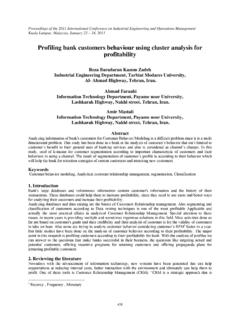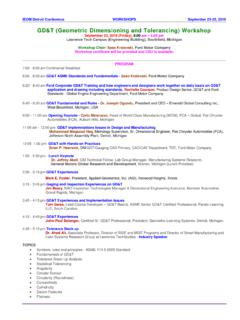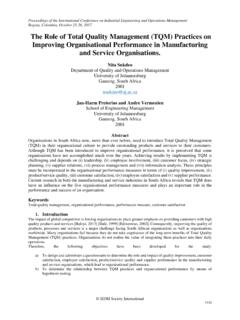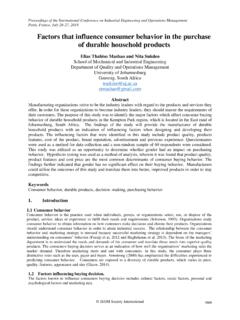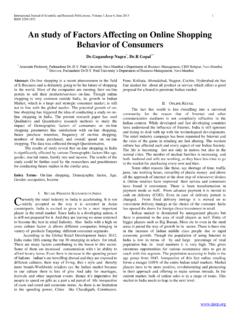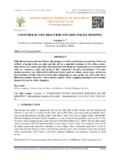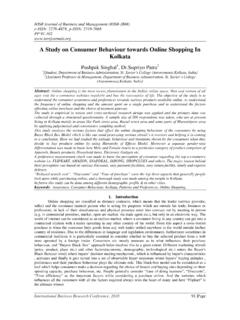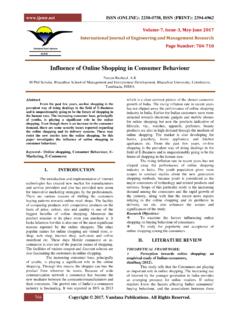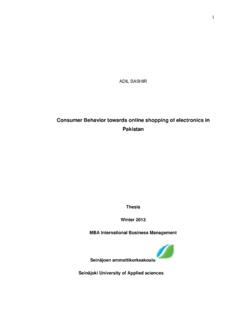Transcription of Factors Affecting Consumers’ purchasing Decision through …
1 Proceedings of the 2016 International Conference on Industrial Engineering and Operations Management Kuala Lumpur, Malaysia, March 8-10, 2016 Factors Affecting Consumers purchasing Decision through E-Commerce Teklehaimanot Tadele Kidane Department of Industrial and Management Engineering Indian Institute of Technology, Kanpur 208016 UP, India Department of Industrial and Management Engineering Indian Institute of Technology, Kanpur 208016 UP, India Abstract the rapid changing Internet environment has formed a competitive business setting, which provides opportunities for conducting businesses online . Availability of online transaction systems enable users to buy and make payment for products and services using the Internet platform. Thus, customers involvements in online purchasing have become an important trend.
2 However, since the market is comprised of many different people and cultures, with diverse viewpoints, e-commerce businesses are being challenged by the reality of complex behavior of consumers. Therefore, it is vital to identify the Factors that affect consumers purchasing Decision through e-commerce in respective cultures and societies. In response to this claim, the purpose of this study is to explore the Factors Affecting customers purchasing Decision through e-commerce ( online shopping ). Several Factors such as trust, satisfaction, return policy, cash on delivery, after sale service, cash back warranty, business reputation, social and individual attitude, are considered. At this stage, the Factors mentioned above, which are commonly considered influencing purchasing Decision through online shopping in literature, are hypothesized to measure the causal relationship within the framework.
3 Keywords: E-commerce; Considering Factors ; Affect; consumers online purchasing Decision I. INTRODUCTION Electronic commerce over the Internet or online shopping has started for the first time in 1994[1]. Since then, Internet usage is no longer limited as a networking media, but it also has a role as marketing and transaction medium for many people. E-commerce nowadays can be constructed easily as cheaper Internet access than ever before and there are many banks that provide the features of Internet Banking (e-banking) that can help support the payment process in e-commerce so that it can be developed quickly. Advances in technology also lead to the development of e-commerce with ease, because at this time there are a lot of free applications to build e-commerce sites.
4 Retailers tend to establish online storefronts as an online retailing method when the product brand names and reputations are well established and widely known among consumers. In line with this, shopping on Internet becomes an alternative for consumers since it is more comfortable than conventional shopping which usually attributed with anxious, crowded, traffic jam, limited time, parking space, etc. So Internet retailing is one of the fastest growing sectors in the world, and is having significant effects on traditional retail provision [1]. Cross cultural comparison study by [2] revealed that, consumers from a different culture exhibit a distinction in conducting e-commerce. This cultural difference is only evident among consumers with no prior e-commerce experience but disappears among consumers with prior e-commerce experience.
5 Two barriers identified to consumers adoption of e-commerce in an international setting: low trust and lack of experience. The cyber market is also comprises of many different people and cultures, which have diverse viewpoints concerning trust [3].Therefore, it is important for electronic businesses to design their websites with all essential services to gain trust from their target customers. The main objective of this study is to identify the most important Factors that affect consumers purchasing decisions through e-commerce from literature and develop framework through which the hypotheses can be tested for causal relationship. Verification of the hypotheses using empirical data is beyond the scope of this conceptual stage.
6 159 IEOM Society InternationalProceedings of the 2016 International Conference on Industrial Engineering and Operations Management Kuala Lumpur, Malaysia, March 8-10, 2016 commerce (e-commerce) is buying and selling using an electronic medium. It is accepting credit and payments over the net, doing banking transactions using the Internet, selling commodities or information using the World Wide Web and so on. Turban et al. [4] define e-commerce as the process of buying , selling, transferring, or exchanging products, services, and/or information via computer networks, including the Internet. Some researchers see e-commerce in terms of Internet applications, such as intranet, extranet, website and email .Others view e-commerce as combination of business processes and Internet technologies such as interactions with customers and suppliers.
7 Even though there is no consensus on definition of e-commerce, there is general agreement among researchers that the main components of e-commerce include: website, email, intranet, extranet, LAN and wireless area network (WAN). We have adopted the above definitions and descriptions of e-commerce. Moreover, online shopping and e-commerce are also being used interchangeably throughout paper. REVIEW Enormous studies have been conducted to ascertain the Factors Affecting consumers online buying behavior. Lee et al. [5] found that perceived value, perceived ease of use, perceived usefulness, firm's reputation, privacy, trust, reliability and functionality have a significant linear relationship to online repurchase intentions. Trust and consumer attitudes have the strongest direct effect on buying online intention; while the convenience, price, broader product selection, and earnings have also strong indirect effect on online shopping intentions through attitudes toward online shopping as mediator [6].
8 Impulse buying intentions, consumer orientation to quality, customer orientation to brands, online trust and online purchasing experience are positively related to prior purchase intention of online customers [7]. According to [8] site design, site reliability, customer service sites, and site safety are the four dominant Factors that influence consumer perceptions of online purchases. Using two different perspectives, namely the technology oriented perspective and trust oriented perspective [9] conducted a survey on online purchase intentions. The outcome of it revealed that, the perceived risk, which is part of the trust perspective and part of the technological perspectives, and perceived ease of use have direct impact on online purchase behavior. Empathy and trust are the Factors that most directly influential in predicting online purchase intentions [10].
9 Findings from [11] showed that, online consumers are more concerned with the quality attributes associated with the resulting quality and customer service rather than the attributes associated with web transactions. There are six perceptions of the quality perceived by customers: (1) information ease of use; (2) quality; (3) consumer service; (4) websites design; (5) process controllability; and (6) outcome quality. Based on the results of their study [12] noted that the confidencein the brand affect decisions to buy online and it may be necessary to increase online sales. Influence of trust in theseller's beliefs varies with confidence in the brands, products and services confidence to be influenced by faith trustin brands. Quality of system and information feature as well satisfaction influenced the use of e-commerce website[13].
10 As per the Saudi Arabian internet users and online shoppers, perceived usefulness, enjoyment, and socialpressure are determinants of online shopping continuance [14]. Promotion and security are the most influentialfactors on customer purchase Decision through Internet [15]. Perceived enjoyment, perceived usefulness, firmreputation and social influence have an impact on a customer s behavioral intentions [16].The results from [17]suggested that information quality, perceived ease of payment, benefits of online shopping , and trust affect onlinepurchase Decision significantly. Sinha and Kim, 2012[18] Also attempted to identify Factors Affecting consumers online purchase behavior considering perceived risks and service and infrastructure concerns.
